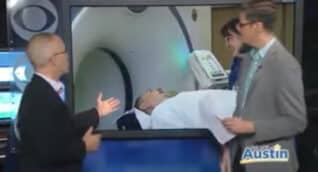Bone and joint imaging are also known as skeletal scintigraphy or bone scan. In this exam, a small amount of radiopharmaceutical is injected into the bloodstream. It accumulates in areas of the skeleton where bone is being remodeled due to injury or disease. A specialized scanner is then used to identify these areas.
- Bone injury, including fractures
- Inflammation
- Infection
- Arthritis
- Cancer originating in bone or that has spread to bone (metastases)
- Metabolic disease
- Unexplained bone pain
- The total exam time can take up to 6 hours, much of which will be spent relaxing and waiting for the radiopharmaceutical to circulate to the skeleton.
- You will be asked to remove jewelry or other metal objects. You may need to change into a gown for the exam.
- Your paramedic or technologist will insert a small intravenous-type catheter into a vein in your arm or hand.
- The radiopharmaceutical will be injected through the catheter into your vein, and you will wait comfortably for 3 hours while the radiopharmaceutical circulates in your body and attaches to your bones.
- While waiting, you will be asked to drink several glasses of water and empty your bladder to flush out any radiopharmaceutical that has not attached to your bones.
- A special scanner will take images of different parts of your body. Depending on the type of study, images may be taken at different times, up to 5 hours after the injection. The scanner may be placed close to your body and rotated around you to record different angles. If you are claustrophobic, inform your technologist prior to the procedure.
- After the scan(s), you will be asked to wait while the technologist checks the images to see if additional images are needed.
- After the procedure, you can return to your normal activities. The radiopharmaceutical is eliminated in your urine and stool over two days, and drinking plenty of water will help flush it out of your body.
- Since you must drink plenty of fluids during the bone scan, limit how much you drink before the exam.
- Avoid taking any bismuth-containing medication (Pepto Bismol), and do not have any X-ray exams that use barium liquid during the four days before the exam. These substances can interfere with bone scan results. Please let your scheduler know if you have ingested bismuth or barium so we can schedule your exam when it will be effective.
- Be sure to tell your technologist about any illnesses or allergies you may have. Also, provide a list of your current medications.
- Tell the technologist if you might be pregnant or breastfeeding. There may be an alternate exam to avoid any risk to the developing baby.
To schedule a bone scan, please call our scheduling team at (512) 453-6100 or toll free at (800) 998-8214. A provider referral is required to make an appointment.
A radiologist who is trained to interpret molecular radiology examinations will analyze the images and send a report to the provider who referred you to ARA. The provider will then share the results with you.

